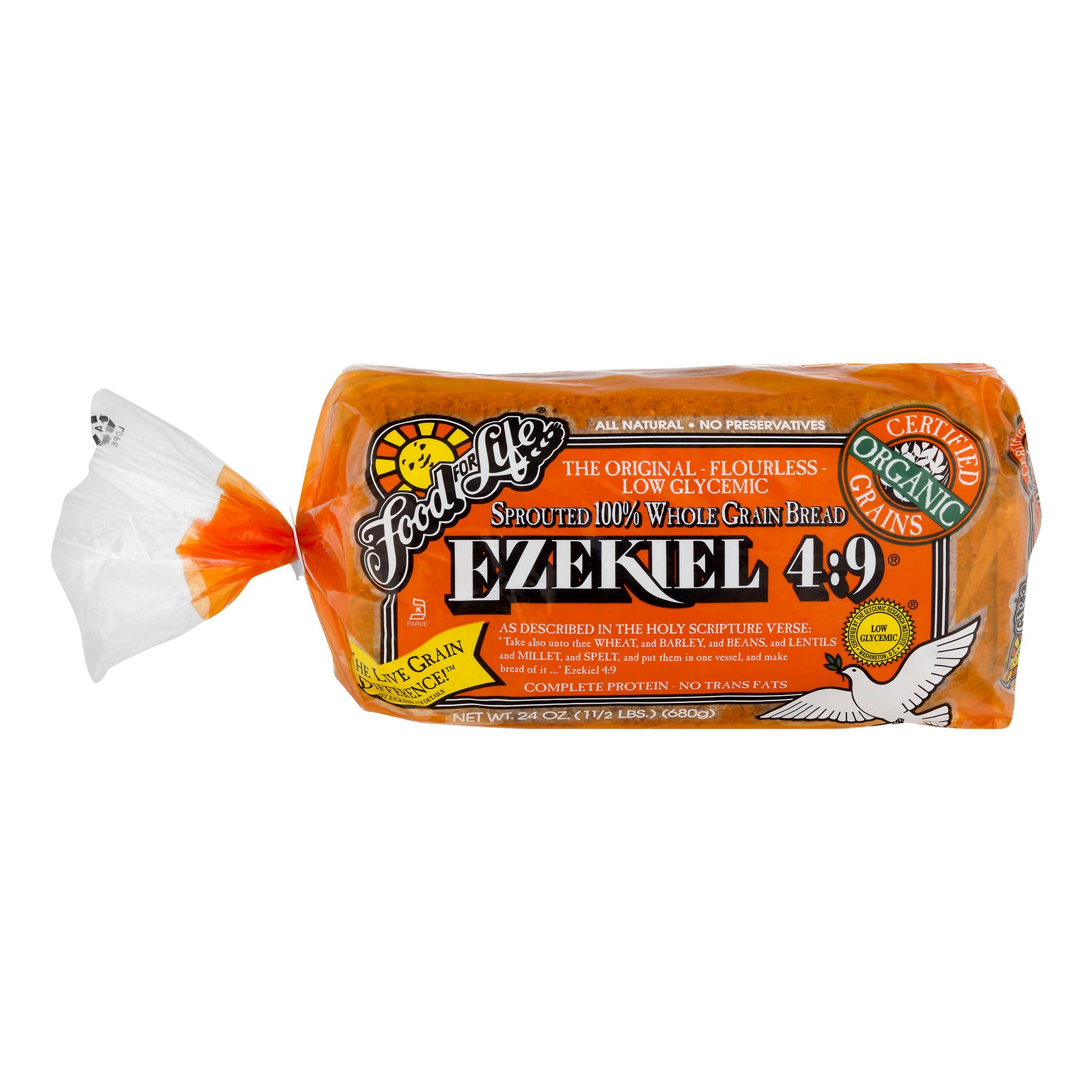
If you’ve been following the nutrition scene for a while now, you’re probably under the impression that you should avoid certain carbs like white bread at all costs. And honestly, there is some truth to that, since white, refined grains are low in fiber and high in simple sugars—a.k.a. they threaten to spike your blood sugar and fat-storing insulin levels. So, yeah, they’re probably not the best option if you’re trying to lose weight or maintain regular blood sugar levels.
But don’t worry—there’s actually a pretty incredible whole grain bread option you may have never thought of before. “Ezekiel bread is bread made from a blend of sprouted grains and legumes. By blending different grains and legumes, Ezekiel bread is able to become a complete protein, which contains all nine essential amino acids,” explains Marissa Meshulam, MS, RD, CDN.
It has a much different nutritional profile from white bread. “By contrast, standard white bread is made with refined flour that has been stripped of its nutrients. Refined grains have the bran and the germ part removed, which as a result, removes most of the fiber and nutrients,” adds Meshulam. Since Ezekiel bread is created with whole grains and legumes, it’s rich in the nutrients you need to get you through your day, like protein.
According to its manufacturer Food for Life, Ezekiel bread is inspired by the Bible, specifically, a verse in Ezekiel 4:9 that reads “Take also unto thee wheat, and barley, and beans, and lentils, and millet, and spelt, and put them in one vessel, and make bread of it…” The ingredients are all pretty hearty—organic sprouted wheat, filtered water, organic sprouted barley, organic sprouted millet, organic malted barley, organic sprouted lentils, organic sprouted soybeans, organic sprouted spelt, fresh yeast, organic wheat gluten, and sea salt. There’s no added sugar in Ezekiel bread either, which means it won’t raise your glycemic index and lead to that awful blood sugar crash.
Keep reading to find out the exact nutrition facts behind Ezekiel bread, and how you can add it to your lunches (and breakfasts, and dinners, why not?!) ASAP.

Ezekiel Bread’s Nutritional Profile
It depends on the brand of sprouted whole grain bread, but according to Meshulam, each slice of Food for Life Ezekiel bread has the following nutrients:
- Calories: 80
- Fat: .05 g
- Saturated fat: 0 g
- Cholesterol: 0 mg
- Sodium: 75 mg
- Carbs: 15 g
- Fiber: 3 g
- Sugar: 0 g
- Protein: 5 g
Is Ezekiel bread really healthy for you?
These stats make Ezekiel bread really good for you—especially when compared to white bread, Meshulam says.Ezekiel bread is free of sugar and artificial dyes, and it’s also low in sodium.It consists of all nine essential amino acids and also is very high in protein and fiber, which means it can keep you full for longer.
The whole grains in this bread contain all three parts of the seed: the bran (the nutritious outer layer), endosperm, and germ (the seed’s nutrient-rich embryo). As a comparison, white bread has the bran and germ are removed during refining and processing. That’s why it’s healthiest to look for whole grains in your carbs whenever possible.
Since Ezekiel bread is sprouted, the grains are easier to digest. That’s because sprouted grains may contain less tough-to-digest starch, and the nutrients are easier to absorb, adds Meshulam. “Ezekiel bread is also traditionally organic, meaning that there is less pesticide residue,” she says. This is key because pesticide residue has been known to have carcinogenic and negative GI effects, research published in Frontiers in Public Health states.
As healthy as Ezekiel bread is, there are a few things to keep in mind when picking it. First, it’s best to choose organic, according to Meshulam. “Conventional wheat is sprayed with glyphosate, which has been linked to long-term health risks like diabetes, high blood pressure, and even certain types of cancer,” she explains.
Just note that those with celiac disease should avoid Ezekiel bread: “Wheat, spelt, and barley are ingredients in Ezekiel bread, and all contain gluten,” says Meshulam. “This is not compatible for a gluten-free diet.” However, if you simply have a gluten sensitivity, the sprouted grains may be easier to digest and cause less inflammation, due to the increase in their level of antioxidants. Antioxidants known as polyphenols are especially important because they can inhibit the inflammatory process.
Lastly, it’s vital to realize that although Ezekiel bread is good for you, it’s still a huge source of carbs, and therefore may not be compatible with a low-carb or paleo diet. Make sure not to overdo your carb consumption, and instead keep it balanced with other food groups.
What are some easy ways to add Ezekiel bread to my diet?
“It’s really a more nutritious upgrade to anywhere you would use bread!” says Meshulam. An open-faced turkey sandwich for lunch is one of her suggestions, but you can also add peanut butter and mashed raspberries for an upgraded “adult PB&J”.If it’s breakfast time, use Ezekiel bread as the foundation of your avo toast or egg sandwich.
You can get a bit fancier with the Ezekiel bread, too. “I also recommend cutting it up and toasting up your own more nutritious croutons, or turning those bread chunks into a panzanella salad with tomato, cucumber, and mozzarella,” she adds. Since you can buy a variety of flavors of Ezekiel bread, like sesame and cinnamon raisin, it can work with any meal or snack, whether you’re craving a savory or sweet treat.
Source: Read Full Article